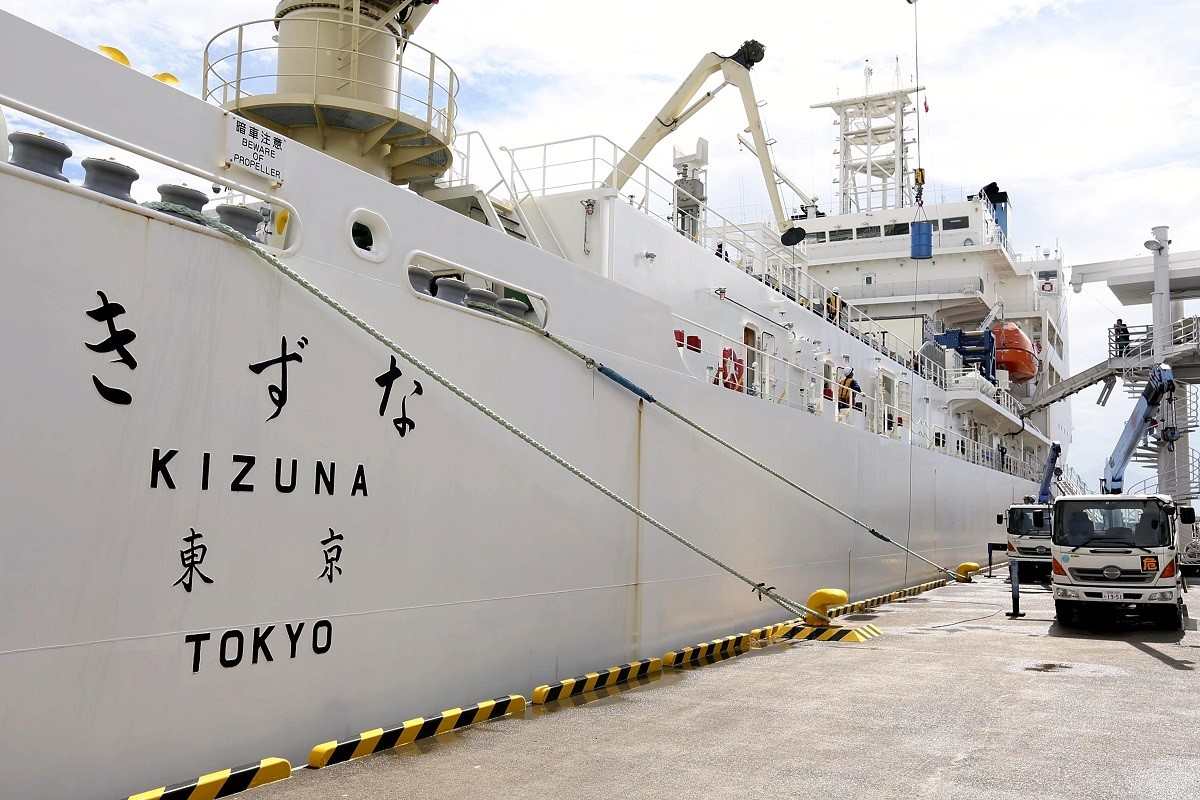
NTT Corp.’s cable-laying ship Kizuna is seen in Yokohama in September 2018.
7:00 JST, February 14, 2023
Vital to international communications, undersea cables around Japan sometimes need to be fixed or replaced. To help private firms do so, the government is looking to support the acquisition of special vessels that lay and repair submarine cables.
The current situation finds Japan relying on chartered ships from abroad as well as the few possessed by Japanese firms for such operations. Thinking of economic security including the protection of information, the government has judged it necessary to strengthen the domestic foundation for such ships.
Submarine cables are laid at the bottom of the sea around the world, with their total estimated length enough to circle Earth 30 times. Ninety-nine percent of telecommunications and data communications between Japan and abroad are through undersea cables.
According to the Internal Affairs and Communications Ministry, Japan’s major telecommunications carriers NTT Corp. and KDDI Corp. have subsidiaries that possess cable-laying ships. When other Japanese companies need to perform operations with undersea cables, they need to charter such ships from abroad.
One of the major reasons most Japanese firms do not possess these ships is the maintenance cost. While submarine cables are easily broken in tsunami, landslides and other natural disasters, it is hard to predict these events, making for another reason Japanese firms are hesitant to own such ships.
At the same time, there is the fear that slow repair of damaged undersea cables will lead to serious consequences. For example, when an underwater volcano erupted off Tonga in the South Pacific in January 2022, the island nation’s only submarine cable was severed, disrupting nearly all communications between the country with overseas.
Amid growing tensions in the Taiwan Strait and Russia’s invasion of Ukraine, there is more awareness of the significance of undersea cables. Caution is needed to prevent other countries from siphoning information through these cables. Another possibility has been pointed out that submarine cables could become the target of attacks in a contingency or an act of terrorism.
Taking such circumstances into account, the ministry incorporated a research cost to support Japanese firms in the second supplementary budget for fiscal 2022. It intends to conduct research mainly on relevant Japanese companies and then decide on specific measures. Reducing their financial burden to possess cable-laying vessels is one measure under consideration.
Top Articles in Business
-

Japan, Italy to Boost LNG Cooperation; Aimed at Diversifying Japan’s LNG Sources
-

Narita Airport, Startup in Japan Demonstrate Machine to Compress Clothes for Tourists to Prevent People from Abandoning Suitcases
-

Asics Opens Factory for Onitsuka Tiger Brand in Western Japan
-

JR Tokai, Shizuoka Pref. Agree on Water Resources for Maglev Train Construction
-

KDDI Opens AI Data Center at Former Sharp Plant in Osaka Prefecture; Facility Will Provide Google’s Gemini AI Model for Domestic Users
JN ACCESS RANKING
-

Japan Institute to Use Domestic Commercial Optical Lattice Clock to Set Japan Standard Time
-

Man Infected with Measles May Have Come in Contact with Many People in Tokyo, Went to Store, Restaurant Around When Symptoms Emerged
-

China Eyes Rare Earth Foothold in Malaysia to Maintain Dominance, Counter Japan, U.S.
-

Israeli Ambassador to Japan Speaks about Japan’s Role in the Reconstruction of Gaza
-

Australian Woman Dies After Mishap on Ski Lift in Nagano Prefecture

























